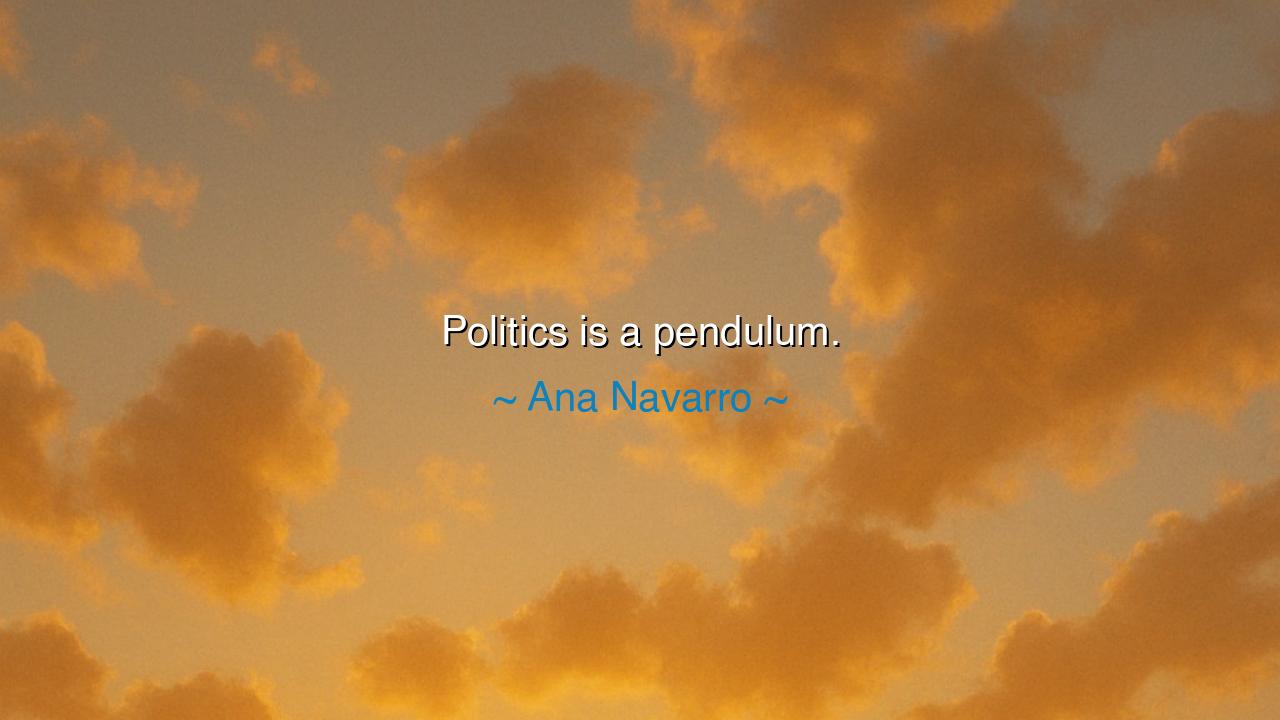
Politics is a pendulum.






Hearken, children of the ages, and ponder the words of Ana Navarro: “Politics is a pendulum.” In this utterance lies a profound reflection upon the rhythms of power and the cycles of governance. Like the pendulum that swings between extremes, the affairs of men and nations are not fixed, but ever in motion, moving from triumph to defeat, zeal to caution, revolution to reaction. Those who grasp the pendulum’s lesson understand that no state, no leader, no policy remains eternal; the world’s tides rise and fall with unerring rhythm.
The origin of this insight springs from the keen observation of Ana Navarro, a modern political analyst and strategist, who, through years of witnessing electoral triumphs and calamities, perceived the cyclical nature of politics. Empires and parties, like seasons, wax and wane. To interpret politics as a pendulum is to recognize the inevitability of change, the necessity of patience, and the wisdom of perspective: what is dominant today may be humbled tomorrow, and vice versa.
Consider the tale of the Roman Republic, whose governance oscillated between populist influence and senatorial authority, between dictatorship and democracy. The rise and fall of leaders like Julius Caesar and the subsequent reforms illustrate the pendulum of political fortune. The wise citizen, observing these swings, learns to temper ambition with caution, to measure triumph with humility, and to prepare for the inevitable return swing of fate.
Even in modern times, this rhythm endures. The electoral shifts of nations—when power passes from one party to another, when ideologies rise and fall—demonstrate the same unrelenting movement of the pendulum. Those who resist its truth are buffeted by surprise and dismay; those who understand it act with foresight, adapting to the ebb and flow, and preserving their principles amidst the oscillations of power.
The lesson extends beyond politics alone, for the pendulum is a mirror of life itself. Fortunes rise and fall, passions ignite and cool, and human hearts swing between hope and despair. In observing the cycles, the wise discern patterns, finding stability not in permanence, but in the knowledge that all things are transient, cyclical, and subject to change.
Therefore, children of future generations, take heed: behold the pendulum of politics, not with fear, but with understanding. Measure each swing, prepare for its return, and let neither triumph nor setback enslave your heart. In this perception lies the wisdom of patience, the strength of foresight, and the serenity that comes from knowing that all things, like the pendulum, follow the eternal rhythm of time.






NTBich Tuyen Nguyen Thi
The pendulum metaphor is a great visual, but I find myself questioning the inevitability of it. It seems like politics is always on a cycle of reactionary responses rather than careful, measured decisions. Are we doomed to always oscillate between extremes, or can we somehow break free from this cycle? How much agency do we actually have in deciding the direction politics takes, or are we all just waiting for the pendulum to swing once again?
LVLe Vu
The idea of politics being like a pendulum makes me think about how our political systems often react to the last big event. After a major change, the pendulum swings one way, only to swing back when a new force arises. But this constant swinging doesn’t necessarily mean progress. Could we be stuck in a loop where no real solutions are being found? Is there any way to stop the swing and create a more steady political system?
VAnGUYEN vAN a
I like how this quote captures the cyclical nature of politics. It’s like each political era or movement is just a response to the one before it, almost like a constant battle for dominance. But is the pendulum of politics always swinging between two extremes, or can it ever stabilize in the middle? Is there hope for a time when society finds a balance where neither side has to feel like they’re always ‘losing’ or ‘winning’?
TNtien nguyen
I can’t help but feel like this pendulum analogy oversimplifies the complexities of politics. Sure, politics might swing back and forth, but there are so many factors involved. What happens when the pendulum doesn’t return to the same point but instead creates new trajectories? Could the back-and-forth create more polarization than any true resolution? How do we navigate a political environment that doesn’t just return to ‘normal’ but keeps evolving in unpredictable ways?
Hhna
This quote from Ana Navarro makes me think about how political ideologies and movements constantly shift, much like a pendulum swinging back and forth. It's interesting to reflect on how each political swing can either push society forward or pull it backward. But, what if these swings get too extreme? Can they eventually lead to a complete loss of balance, or do they help us find a middle ground over time? I wonder how long this pendulum can continue without some form of stagnation or breakdown in the system.